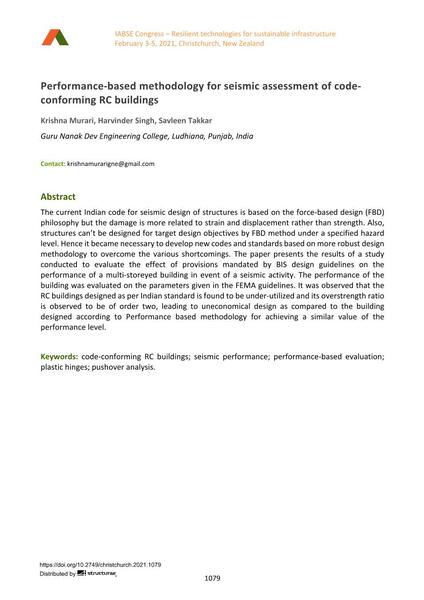Performance-based methodology for seismic assessment of code- conforming RC buildings

|
|
|||||||||||
Détails bibliographiques
| Auteur(s): |
Krishna Murari
(Guru Nanak Dev Engineering College, Ludhiana, Punjab, India)
Harvinder Singh (Guru Nanak Dev Engineering College, Ludhiana, Punjab, India) Savleen Takkar (Guru Nanak Dev Engineering College, Ludhiana, Punjab, India) |
||||
|---|---|---|---|---|---|
| Médium: | papier de conférence | ||||
| Langue(s): | anglais | ||||
| Conférence: | IABSE Congress: Resilient technologies for sustainable infrastructure, Christchurch, New Zealand, 3-5 February 2021 | ||||
| Publié dans: | IABSE Congress Christchurch 2020 | ||||
|
|||||
| Page(s): | 1079-1086 | ||||
| Nombre total de pages (du PDF): | 8 | ||||
| DOI: | 10.2749/christchurch.2021.1079 | ||||
| Abstrait: |
The current Indian code for seismic design of structures is based on the force-based design (FBD) philosophy but the damage is more related to strain and displacement rather than strength. Also, structures can’t be designed for target design objectives by FBD method under a specified hazard level. Hence it became necessary to develop new codes and standards based on more robust design methodology to overcome the various shortcomings. The paper presents the results of a study conducted to evaluate the effect of provisions mandated by BIS design guidelines on the performance of a multi-storeyed building in event of a seismic activity. The performance of the building was evaluated on the parameters given in the FEMA guidelines. It was observed that the RC buildings designed as per Indian standard is found to be under-utilized and its overstrength ratio is observed to be of order two, leading to uneconomical design as compared to the building designed according to Performance based methodology for achieving a similar value of the performance level. |
||||
